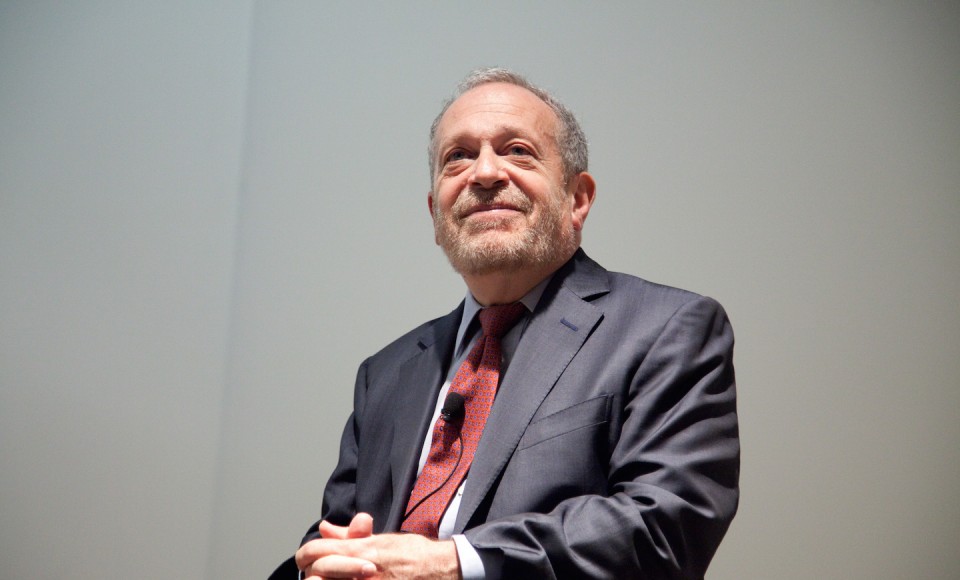Former Labor Secretary Robert Reich struck a cautiously optimistic note when he spoke at the LBJ School as part of the Liz Carpenter Lecture Series on Tuesday, September 8th. Although Reich was quick to catalogue the challenges facing the United States economy, he sketched out ways that US workers—and not just corporations—can thrive in the new global economy.
Reich, formerly the Labor Secretary under President Bill Clinton and currently a professor of public policy at UC Berkeley, led off with what would be his two main themes for the evening: structural changes to the economy and the resulting question of “who gets what.”
The structural changes, he said, are mainly the result of the complex set of transformations loosely known as “Globalization” (although he cautioned that, “Never before has a term gone from obscurity to meaninglessness so quickly”). Reich argued that conventional notions of how and why the US—and US workers—have suffered under globalization are “Dead wrong. Fundamentally, powerfully, importantly wrong,” and cited two popular misconceptions about globalization: first, that globalization means trying to compete with low-cost labor in countries like Bangladesh, and second, that the health of the US economy could be gauged by the health of US corporations. With the rise of transnational corporations, he said, our standard of living depends not on their bottom lines, but on what US workers can add to the integrated global economy. And, Reich argued, US workers can add far more than low-cost labor.
As an example, Reich mentioned his recent hip replacements. The two high-tech artificial hips he received were not manufactured in Bangladesh, in China, nor in any other country known for low labor costs. In fact, they were made in Germany, a nation with a higher median wage than the United States. As a member of the European Community, Germany is subject to more global competition than the US, he argued, yet German workers command high wages and enjoy a high standard of living because of the “value added” that they bring to global manufacturing.
Countries like Bangladesh cannot compete with the precision engineering that Germany is known for. Reich painted the picture of “skilled, experienced” German workers, earning higher wages than their US counterparts, sitting behind banks of expensive computers, manufacturing his high-tech hips. These workers, he said, were not replaced by technology, but were thriving because of their ability to add value by employing technology. But Germany, he cautioned, was only able to do this because they maintain “world class” technical, vocational, and apprenticeship programs—and because they are open to the notion that a four-year college education is not the only way to a middle class income.
When asked whether he thought re-industrialization was an option for the US economy, Reich was unequivocal—factories are mostly automated, he said, and technology will continue to replace manufacturing jobs. The key to the economic future, he continued, is not manufacturing, but services. Giving an iPhone as an example, Reich pointed out that it looks very much like a “product”—it’s a tangible object and was, in fact, produced in a factory. But a modern understanding, he said, is that the true value of the iPhone is as a “bundle of services:” design services, engineering services, research services, legal services, financial services, advertising services, and more. Manufacturing and services, he said, are intertwined today, and adding value through the provision of services is the US workers’ hope for the future.
“Who gets what,” however, remains a pressing issue, and Reich sees ominous signs in the current climate of wealth inequality, which he says has reached a “crisis point.” Together with the corrosive effect of unlimited money in political campaigns, Reich warned that when people are frustrated and angry and feel that “the game is rigged,” they will move in one of two directions: either towards fundamental reform (as in the Progressive Era, the New Deal, or LBJ’s Great Society), or towards authoritarianism. “That,” Reich cautioned, “is the fundamental choice ahead.”
The solutions, he said, are not easy, but they are clear. The first thing to do about inequality is to get big money out of politics. Reversing the rulings in Citizens United and McCutcheon will be hard, but “the right president means the right Supreme Court justices.” Reich also advocated full disclosure and reporting of campaign contributions so that citizens will have a clear view of just where the money is coming from in US politics.
In closing, Reich said that the traditional US debate between free markets on one hand and government on the other was “meaningless:” without government enforcing rules, “there is no such thing as a free market.” The issue, he concluded, and the critical debate for our time, “is not the size of government. The issue is, fundamentally, one of who government is for.”
Edited by Cheryl Hanmaker

